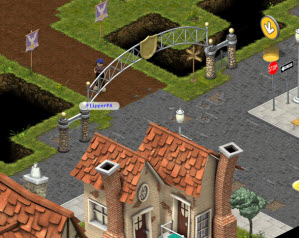 There are 30,000 new virtual worlds on the web today, thanks to Metaplace.
There are 30,000 new virtual worlds on the web today, thanks to Metaplace.
The San Diego-based company has created a platform that lets users create their own characters and virtual worlds. They are all interconnected in one site, which can highlight various worlds through its centralized plaza.
“The vision is to make virtual worlds into a first-class citizen of the web,” said Raph Koster, chief executive of Metaplace. “It has been the province of uber geeks, but our goal is to let anyone create one. I wanted to democratize them the way YouTube democratized video.”
Starting today, Metaplace is kicking off an author series where authors can engage in group chats with dozens of other virtual world visitors. Koster, who spoke at our recent GamesBeat conference, calls it Metaplace Masters, where fans can engage with famous people. Today’s speaker is Tobias S. Buckell, who is a sci-fi author writing the next Halo novel.
Don’t expect to be overly impressed just yet. The graphics are cartoonish, and you can only do so much with the free patch of turf you start with. If you want to build a bigger world, you have to take out a subscription. The exact fees are still being set.
The whole idea is to take user-generated content to its logical extreme. While you can create your own virtual character and room in online destinations such as Habbo and IMVU, the goal of Metaplace is more ambitious. You not only create your own online character to explore other worlds, but you can also create your own virtual world, starting from a simple homestead.
You can view the virtual worlds from any platform, not just a PC. That includes web-viewing devices, but not iPhones. Koster said the company had to invest a lot of resources in the infrastructure and tools that could make the creation of a world easy. The platform is based on Adobe Flash and uses no plug-in for your browser.
Metaplace essentially provides building blocks to create worlds. If you want to have a streaming audio system for concerts in your world, you can simply click on the feature to add it. You can also easily adopt combat systems for a game or pre-fabricated creatures.
Creating a virtual world is a lot like creating a character in The Sims. You can modify your character in a variety of ways, but you don’t get as many choices as if you were designing a Sims character. Then you can create a house and start picking furniture to use in the house. If you run out of money, you can either earn it or purchase some more via a virtual currency system. You can also pay to create an event like a concert where you buy a 24-hour pass that lets you invite many more people than usual into your virtual world. And you can pay to advertise your world by renting a “teleporter” that lets people access your world from the main drag.
Users have created a wide variety of worlds. There are concert halls where people can gather. There are games, puzzles, classrooms, and side-scrolling action games. Fans have been creating homages to I Love Lucy or their favorite bands. But there isn’t much by way of 3-D graphics just yet. That might be something that evolves over time.
Koster has built a track record as a pioneer of massively multiplayer online games and served as a creator of many successful virtual worlds, including Electronic Arts’ Ultima Online, and Sony Online Entertainment’s EverQuest II and Star Wars Galaxies.
He founded the company as Areae in 2006 and received initial funding later that year. In October, Metaplace raised a new round of $6.7 million, bringing its grand total to $9.4 million. Backers include Crescendo Ventures and Charles River Ventures.
Koster said the company’s timing was good for raising money, as 2006 was the beginning of venture capital interest in virtual worlds and games.
Metaplace has about 25 employees now. Koster said the launch so far is exceeding expectations. There are more than 200 kids virtual worlds being designed by a bunch of different game companies. But he believes there is room for many such worlds, just as there is room for lots of brands or TV shows that focus on kids. Competitors include Small Worlds and Whirled.



